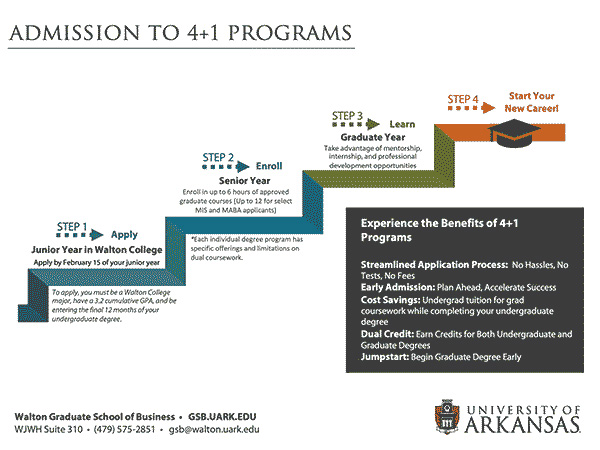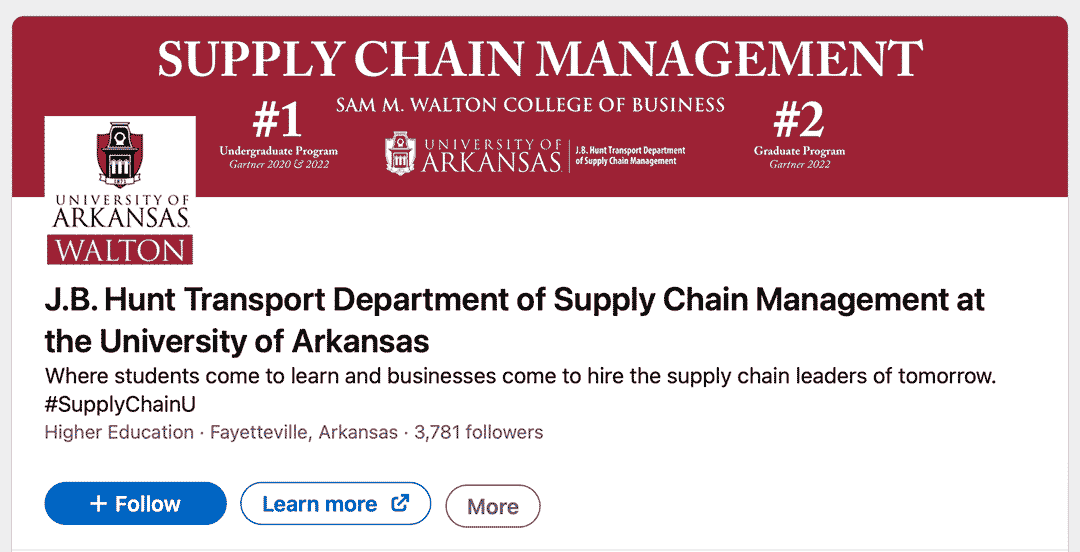Master of Science in Supply Chain Management
With increased demands from customers, suppliers, and shippers, a wide array of employers
are seeking professionals with advanced knowledge of supply chains.
Our master’s program will equip you with the knowledge and skills you need to drive
success and deliver value in your organization.

The Master of Supply Chain Management will prepare you for leadership roles in sourcing, planning, logistics, and new product
introduction.
You’ll learn a systems approach to sustainably manage the flow of materials into and
through an organization to its customers by applying analytical, technological, and
managerial skills.
Choose a Degree Path
This specialized degree can be obtained part-time on campus in a blended weekend delivery, or 100% online.


Career Outlook
Job prospects for graduates?
What can I expect?

Courses and Schedule
What coursework is required for this degree?

Just the Facts
How Much? How Long?
Who can enroll?
How Do I Enroll?
Admission to Walton College masters programs is selective. Enrollment in each program is limited.
Meet Our Alumni
Get to know our alumni students from the Master of Science in Supply Chain Management program.
Elite Supply Chain Degrees
Gartner, the leading global research firm, ranked our supply chain graduate programs as the second best in North America in 2022.
U.S. News also ranked our graduate programs in the top 10 of public universities in 2022.
And our undergraduate supply chain program was ranked #1 in North America by Gartner in back to back periods (2020 and 2022).
Flexible Course Schedule
Part-Time Schedule
The flexible, part-time schedule, is built for working professionals in mind.
100% Online Option
Students can choose online delivery for flexibility and convenience.
The Department of Supply Chain Management and the Graduate School of Business have structured this program to meet the needs of working professionals as well as traditional full-time students. Do you have questions about your schedule options? Contact us.
Just the Facts: Master of Science in Supply Chain Management
Program Length
30 Credit Hours
Flexible Schedule
Start Date
Fall and Spring Semesters
Both the on-campus program and the part-time blended program begin in the Fall and Spring Semesters.
Admissions Info
Do I Qualify to Enroll?
Complete your undergraduate degree and meet additional requirements. View Requirements
Entrance Test
GMAT or GRE
Students may be eligible for a GMAT/GRE test waiver with a 3.2 undergraduate GPA or 3 years of professional work experience. Please review our master's admissions policies.
Application Deadline
Fall Deadlines
International applicants: February 15
Priority (domestic applicants): April 15
Final (domestic applicants): July 1
Spring Deadlines
International applicants: August 15
Final (domestic applicants): November 1
Estimated Program Cost
On-Campus Program
View Cost Breakdown
100% Online Program
View Cost Breakdown
Class Profile
Current Students
View a listing of current Master of Science in Supply Chain Management Students.
4+1 Degree Option
The 4+1 Master of Science in Supply Chain Management program option will allow well-prepared undergraduate students to begin graduate courses during the last year of their undergraduate studies.
WHO: Walton students with a 3.2 undergraduate GPA.
WHAT: Early consideration for a graduate program and possible dual credit between an undergraduate and graduate degree.
WHEN: Apply by February 15 during the spring of your second-to-last undergraduate year for a fall start, or by September 15 of your final year for a spring start.
WHY: Save time and potentially money!
How can I apply for the 4+1 degree option?
Students interested in the 4+1 Master of Science in Supply Chain Management program will require additional guidance and advising.
Hear From Program Faculty
Learn more about the Master of Science in Supply Chain Management, directly from program faculty.
Podcast Interview
David Dobryzkowski, Associate Professor and former director of the Master of Science in Supply Chain Management program, sits down with Dean Emeritus Matt Waller to discuss the program and how incoming students stand to benefit.
Career Outlook
Per the U.S. Bureau of Labor Statistics, “employment of logisticians is projected to grow 18 percent from 2022 to 2032.” Common job titles associated with the knowledge and skills obtained from the program are:
- Supply chain managers
- Logistics managers
- Director of operations
- Purchasing managers/buyers
- International supply chain manager
- International logistics consultant
- Commodities manager
- Director of supply chain operations
- Logistics management analyst
- Logistics director
- Global logistics manager
- Manufacturing and operations director
- Supply chain project manager
According to salary.com, the median salary for a supply chain manager with a master's degree or MBA is $119,628 - $128,065. Education, location, experience and supervisory duties influence salary amounts.
Jobs and Salaries
$119,628 - $128,065
National median salary for a supply chain manager with a master's degree or MBA per salary.com.
208,700
Number of logistician jobs in the United States in 2022.
+38,300
Projected numeric change in the number of employed logistician from 2022 to 2032. (+18% change)
Source: Bureau of Labor Statistics, U.S. Department of Labor (2022)
Career Development
Close ties with our corporate partners facilitate recruiting and networking opportunities, internships, and careers.
Students can participate in corporate internships, career counseling, and take advantage of all the Walton College Career Services has to offer.

The Northwest Arkansas Community
Join a supportive and engaging community located in the vibrant business network of Northwest Arkansas, with over 300 Fortune 500 companies with a presence in the region.
Business leaders and Walton College alumni are closely connected to the college and the Supply Chain program, not just during your studies, but throughout your career.
Courses Overview
To obtain the Master of Science in Supply Chain Management, the following 30 hours of coursework must be completed.
Core Courses
SCMT 56303: Foundations for New Product Launch and Integrated Demand-Driven Value Networks
Supply chain management is the integration of key business processes from end user through suppliers. The focus of this course is on the business fundamentals and core processes that must be linked throughout the supply chain in order to ensure the effective development and delivery of products and services that satisfy customers.SCMT 56603: PLAN: Demand Planning and Inventory Operations
This course examines the integrated planning and management of supply chain activities including, notably, demand forecasting and replenishment within sales & operations planning. In addition to modeling related decisions both in within-firm and supply chain contexts, strategic issues related to interfirm coordination and collaboration will be discussed.SCMT 56803: SOURCE: Global Procurement and Supply Management
In the global supply chain sourcing and procurement plays a critical role in ensuring supply, growing margins and contributing to reliable delivery to customers. This course covers the core sourcing and procurement processes of strategic sourcing, supplier relationship management and takes a leadership approach to those covering topics such as change management and business alignment issues involved.SCMT 56903: Supply Chain Performance Management and Analytics
This course will examine standard and advanced analytical techniques used to transform data into actionable business intelligence and students will gain hands-on experience with these techniques. Students will gain an understanding of the practical considerations that arise in real-world applications by means of a term project. They will gain exposure to data science software capable of advanced predictive analytics and also through cases, expose them to innovative ways in which firms are using analytics to improve supply chain management processes.SCMT 57303: Supply Chain Strategy, Governance and Change Management
Evaluate and select appropriate supply chain strategies, change management approaches, and governance structures for business situations. This course leverages plan, source, make, deliver, customer service, and new product development capabilities to meet strategic and financial goals in demand-driven value networks.SCMT 57203: DELIVER: Customer Service and Distribution Management
This course is designed to provide students with a broad understanding of the customer service and delivery processes needed to drive demand-driven value networks. The emphasis of this course will focus on systemic alignment across the functional capabilities of customer fulfilment service quality, transportation, distribution and return capabilities across the supply chain, with a specific emphasis on governance, performance management and the integration of advanced technologies.SCMT 57103: MAKE: Achieving Operational Excellence
This course focuses on understanding the key processes involved in providing valuable products and services for customers as well as important approaches to continuously improving these processes. Learners will leave this course with skills necessary to continuously improve the key manufacturing and service processes involved in providing valuable products and services to customers, as well as the project management competencies necessary to embedded new, innovative capabilities in their supply chains.Choose 9 hours of approved business electives.
Electives
Electives are chosen by the student in consultation with the Supply Chain Management M.S. Program Director. Approved electives (9 hours) may be any graduate course approved by the Supply Chain Management M.S. Program Director.Saturday Class Dates
| Summer 2024 |
Fall 2024 |
Spring 2025 |
Summer 2025 |
| May 18 |
August 24 |
January 18 | May 17 |
| June 15 |
September 21 |
February 15 | June 7 |
| July 6 |
October 26 |
March 8 | June 28 |
| July 27 |
November 9 |
April 5 | July 26 |
| |
December 7 |
April 26 |
* Students admitted to the professional programs in the Walton College are required to attend a multi-day orientation prior to the start of scheduled courses. Dates to be determined. Please contact gsb@walton.uark.edu for more information.

 Schedule a Time to Talk
Schedule a Time to Talk  Apply for this Degree Program
Apply for this Degree Program  View a Pre-Recorded Information Session
View a Pre-Recorded Information Session 






















Connect with Walton College.
Stay Informed